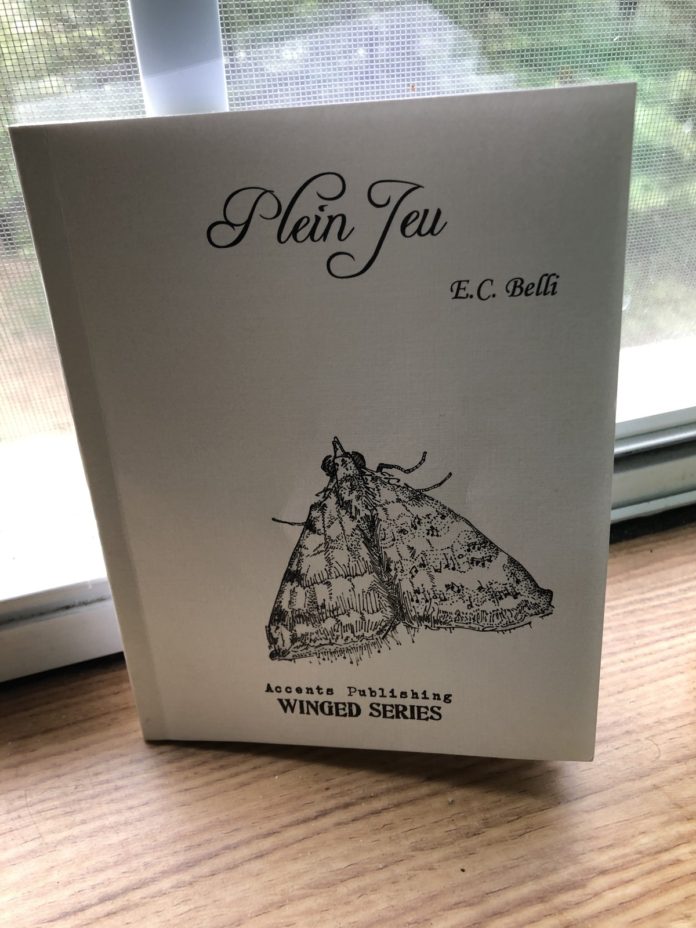Welcome to Lit Review, where columnist Dominiq Wilson will take apart a series of chapbooks to figure out what works and what doesn’t for the modern reader of poetry.
Plein Jeu by E.C. Belli is a chapbook within Accents Publishing’s Winged Series. This chapbook won a poetry chapbook contest, where authors submitted poetry manuscripts with the hopes of winning a prize of $300 dollars in addition to 30 copies of their perfectly bound chapbooks. As a result of winning the contest, the chapbook was published. The second book of this series will be reviewed in the following week.
The very first poem of this chapbook tells the story of a mother narrator. Don’t be fooled like I was: the mother isn’t a parental figure, but a person who participates in the activity of “mothing.” “Mothing” is defined as the act of watching moths. To get a better idea of “mothing,” here is “Self Portrait as Mother.”
*mother, n. [/mɑθər/] — To watch butterflies or moths is an activity known as
“butterflying” or “mothing.” A “mother” is someone who engages in this pursuit.
It is the mimicry, the cryptic eyespots that say the owl feeds on the owl
moth. It is how, in our observation, we find
someone will consume us too
and pull, by day, the dust off our backs, and swallow
by dusk the tiny scales that make up the dust. In the sink
the noctuid creature, hairy, still on ceramic,
uncurls its straw-tongue, as if to feed.
It is to be sought after. Not found.
It is to always sleep with wings open.
Poems in this collection that seem to carry these themes include “Transverse Orientation” and “Asphodel City.”
In this collection, there are quite a few poems that take up two pages, but there is only one that covers three pages: “Cantique.” The note under the title says that it’s named after French composer Gabriel Fauré’s “Cantique de Jean Racine,” which is a classically composed song that seems to mimic a hymn. Fauré wrote it when he was nineteen for a composition competition and won first place.
“Cantique,” in addition to being named after a beautiful piece of music, is also the first of a two-part story. In the story, a teenage narrator is telling about playing a piano in a church that she doesn’t attend on a regular basis. She seems to be semi-enjoying herself; however, in “Prelude VI,” which follows the same narrator later in her life, she doesn’t seem to enjoy the piano as much as she did when she was younger. The poem suggests that the pianist, now older and with many more years of performative piano playing up her sleeve, no longer finds pleasure in the instrument. She rejects the piano like she would reject a significant other. With an extended amount of emotional stress, the decision is made.
Like the last chapbook, there was a time that the poems in this book reminded me of previous poetry I’ve read this year. A poem from “Plein Jeu,” “After Our Wedding,” is arranged in couplets like many of the poems in L. A. Johnson’s Little Climates.
“After Our Wedding” follows a similar structure to Johnson’s poetry in the way that the use of couplets provides the writer with the freedom to pair the last of the good with the beginning of the bad in the same sentence. The poem isn’t structured to where the good and bad clash in the middle of the poem, but the last two stanzas seem to be the turn of events, leaving the good to be cataloged while the bad can only be imagined. I encourage you to read it below:
We woke to the sky,
to digestive sounds.
To little buds baking
Like premature births.
We woke during the hour
everything appears
so somber
even the trees,
their uneven cloaks,
radiate light.
It was a day
of blinking rain
and evanescent sun
we woke up to
and complained about
twice, the second time
as your feet sank
into the Styx.
Being a huge fan of Greek mythology, as many readers of the “Percy Jackson” series may have been at some point, I was aware that going into the River Styx makes you invulnerable except for one spot. If stabbed in this specific spot, you would die. How this applies to a married couple is beyond me, but something tells me that it isn’t a good thing.
Before I finish this review, I wanted to give “Night Bloom” an honorable mention. It doesn’t seem to connect with any other poems, nor does it remind me of any other poems I’ve read, but the theme of it seemed to capture the equally supernatural and fantastical experience of listening to music at night. I’m a night owl myself, and I often use music to help me sleep, but it also has a chance to help my imagination wander. That isn’t too great when I want to go to sleep, but it is a really fun experience to replace sleep with.
Once again, I’d like to thank Professor Manning for letting me borrow this book, among many more that are currently sitting on my desk. If you’d like to purchase this book, it’s $5 on Accents Publishing’s website and is currently limited, so please reach out to them via email before buying.



